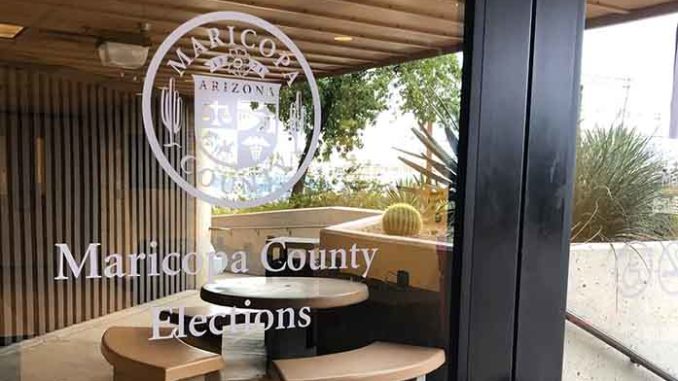
After denying for more than a year that anything went wrong at all with all it handled the 2020 General Election, Maricopa County officials admitted Wednesday that its handling of the biggest election turnout wasn’t perfect.
It just wasn’t nearly as bad as the Arizona Senate’s audit team alleged, according to Maricopa County Recorder Stephen Richer and multiple county election department employees.
In what appeared to be a carefully choreographed four-hour livestreamed event, Maricopa County officials addressed 75 claims put forth by the Senate audit team led by Cyber Ninjas Inc. in a series of reports to Senate President Karen Fann in September. The auditors’ claims were characterized by the county as being either false, inaccurate, or misleading.
The county’s election staff asserted that only one of the 75 items had merit – the likely double counting of 50 ballots. It was the first time in more than one year that Maricopa County admitted an error could have been made in its handling of more than 2 million ballots cast during the 2020 General Election.
However, the county’s definition of a misleading claim acknowledged that the underlying fact was correct; the audit team just put forth the claim in such a way as to misrepresent what happened. A false claim, on the other hand, could have properly explained if Cyber Ninjas or their subcontractors had put a little effort into understanding the underlying issue, county officials contend.
The majority of the 75 claims were inaccurate, according to the Richter and Election Day Voting Director Scott Jarrett. That meant the audit team’s claim was based on an incorrect understanding of the issue, such as not knowing election law or how to decipher election data.
Jarrett said it was likely that auditors would come to faulty conclusions if they started out “biased and not using an objective process.” But county officials conceded Wednesday that as a result of the audit there will be a change to how ballot duplication is conducted.
Duplication is the process of creating a new ballot that can be read by the tabulation machine if the original ballot was damaged or otherwise soiled. It is also necessary to create a duplicate ballot for the thousands of military members and other Arizonans living overseas who are permitted to vote via email under the Uniformed and Overseas Citizens Absentee Voting Act (UOCAVA).
A unique serial number is supposed to be affixed to the original voting information and the duplicated ballot so the two can be quickly matched up. But according to Senate Audit Liaison Ken Bennett, auditors faced difficulty trying to accurately match up the Maricopa County duplicated ballots.
Bennett, a former Arizona Secretary of State and former Senate President, has often used the ballot duplication difficulties as an example of how Maricopa County’s processes weren’t perfect.
Another revelation made by elections staff Wednesday is that not every one of the almost 2.1 million ballots was cast legitimately, prompting a change to how the County Recorder updates the voter registration system for deceased voters.
There is the possibility that 26 voted ballots were received by the County Recorder’s Office in the names of voters who may have been dead prior to the ballot being submitted. In addition, the county’s review found a handful of voters may have cast ballots in Maricopa County and another county, and a few voters may have actually voted twice within Maricopa County.
All of that information has now been referred to the Arizona Attorney General’s election integrity unit, one year after the ballots were received in the election.
And although Board chair Bill Gates commented on how he wanted Wednesday’s presentation to be “the last word” about the 2020 General Election, his wish did not take into consideration two factors.
One is that Arizona Attorney General Mark Brnovich was asked months ago by Fann to investigate some concerns identified by the audit team. The second is that Maricopa County has previously agreed to answer some of the Senate’s questions about the county’s routers and Splunk logs.
Those questions were only recently presented to former Congressman John Shadegg who was hired by Fann to solicit answers from county officials. It is possible that further legal action would be necessary if Shadegg or Fann believe Maricopa County is not acting in good faith to address those questions.
Maricopa County’s rebuttal came one day after the Arizona Supreme Court denied a petition from Cyber Ninjas to get involved in a public records dispute. As a result, Cyber Ninjas must immediately comply with a lower court order to turn over a trove of audit-related documents in a lawsuit filed by Phoenix Newspapers.
